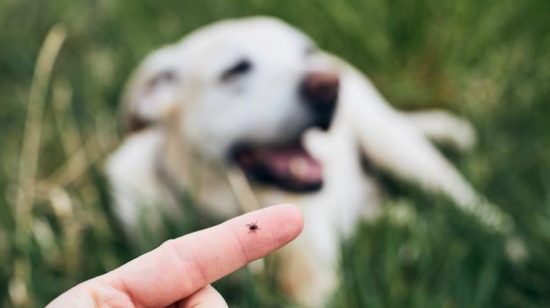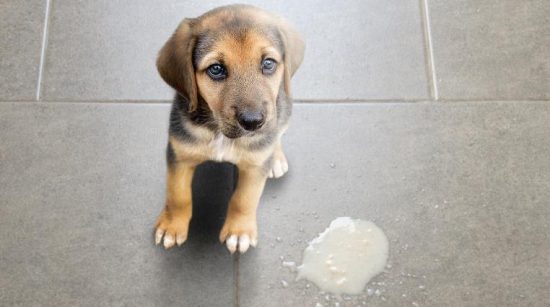Why Does My Neutered Dog Air Hump? Explained
Uncover reasons behind your neutered dog’s air hump habit and learn about the behaviors and health implications for your canine friend.
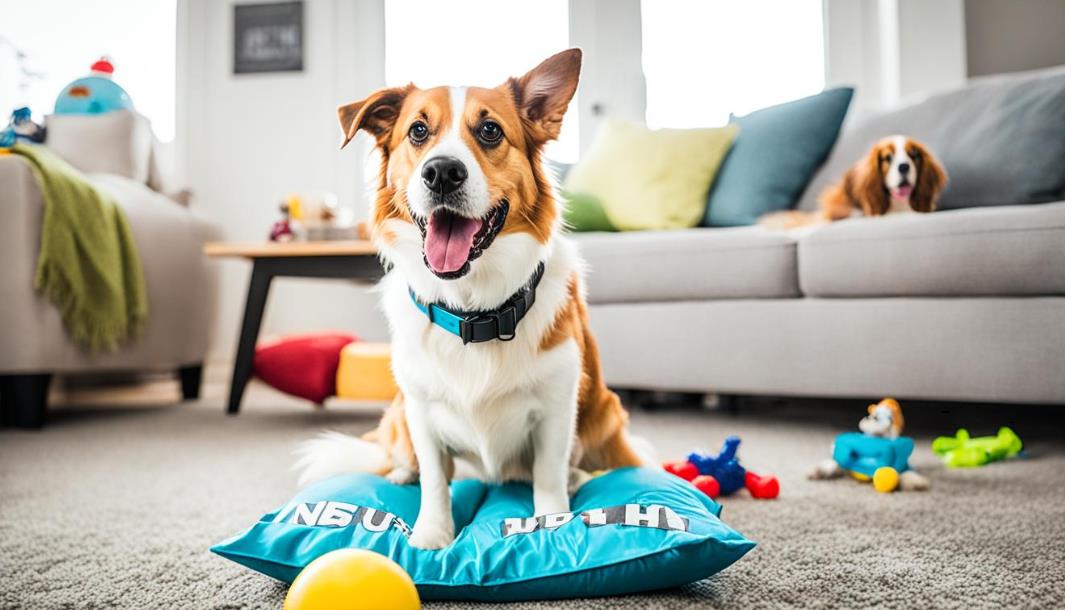
Did you know that even after being neutered, many dogs still exhibit air humping behavior? It’s a surprising phenomenon that leaves pet owners perplexed. If you’re wondering why your neutered dog engages in this behavior, you’re not alone. In this section, we will delve into the various reasons behind why neutered dogs air hump and provide an explanation for this curious behavior.
By understanding the underlying causes, you can gain insights into your dog’s behavior and learn how to address and manage it effectively. So, let’s explore the world of neutered dog air humping and unravel the reasons behind this peculiar canine behavior.
Understanding Canine Behavior: The Phenomenon of Neutered Dogs Air Humping
When it comes to understanding the behavior of neutered dogs, the phenomenon of air humping can be quite puzzling for pet owners. This section will delve into the broader understanding of canine behavior and shed light on why neutered dogs engage in this behavior. By exploring the factors such as normal play behavior, dominance and social structure, and the effects of neutering on a dog’s sex hormones, you can gain a deeper comprehension of this behavior.
Normal Play Behavior in Dogs
Play behavior is a natural part of a dog’s life, offering opportunities for mental stimulation, exercise, and social interaction. Dogs engage in various play behaviors, including chasing, wrestling, and yes, even humping. It’s important to remember that air humping during play does not necessarily indicate any underlying behavioral issues, but rather forms a part of their social interactions and communication.
The Role of Dominance and Social Structure
Canine social structure plays a significant role in understanding air humping behavior. Dogs are social animals that establish a hierarchical structure within their pack, whether it be with other dogs or their human family. Humping can be a display of dominance or an attempt to assert control or social status. It is important to differentiate between dominance-related humping and humping as a form of play or stress release.
Effects of Neutering on a Dog’s Sex Hormones
Neutering, or spaying and castration, can influence a dog’s behavior by altering their sex hormones. While neutering can reduce sexual behaviors such as mounting, it does not eliminate these behaviors entirely. Neutered dogs can still exhibit humping behavior due to learned habits, social interactions, or other underlying factors. Understanding the effects of neutering on a dog’s sex hormones is crucial in comprehending why neutered dogs may engage in air humping.
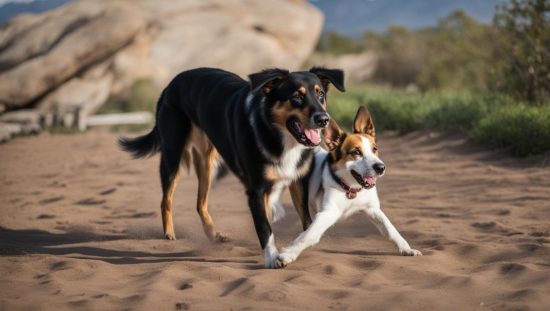
| Neutered Dog Behavior | Air Humping in Dogs | Canine Social Structure |
|---|---|---|
| Understanding the behavior of neutered dogs | Exploring the phenomenon of air humping | Examining the impact of social structure on canine behavior |
| Normal play behavior in dogs | Factors contributing to air humping behavior | Differentiating dominance-related humping from other forms of humping |
| The effects of neutering on a dog’s sex hormones | Explaining humping behavior in neutered dogs | Linking social structure to air humping in dogs |
In the next section, we will debunk common misconceptions surrounding air humping in neutered dogs, providing you with a clearer perspective on why this behavior occurs.
Common Misconceptions About Air Humping in Neutered Dogs
There are several misconceptions surrounding air humping in neutered dogs that can lead to misunderstandings and unnecessary concerns for pet owners. By addressing and debunking these misconceptions, we can gain a better understanding of why neutered dogs engage in this behavior.
One common misconception is that humping is solely a sexual behavior. However, air humping in neutered dogs is not always motivated by sexual desire. It can also be a form of communication, a way for dogs to express excitement, establish dominance, or seek attention.
Another misconception is that only intact dogs exhibit humping behavior. While intact dogs may hump more frequently due to their hormones, neutered dogs can still engage in air humping. Neutering reduces the levels of sex hormones, but it does not completely eliminate the possibility of humping behavior.
Some pet owners may also mistakenly believe that air humping is always a sign of behavioral issues or a lack of training. However, dogs may hump due to various factors such as stress, anxiety, or a response to environmental triggers. It’s important to consider the context and individual circumstances before attributing humping behavior solely to behavioral problems.
By dispelling these misconceptions, pet owners can have a clearer perspective on why their neutered dogs engage in air humping. Understanding the underlying reasons behind this behavior can help pet owners address it effectively and provide appropriate behavioral management techniques.
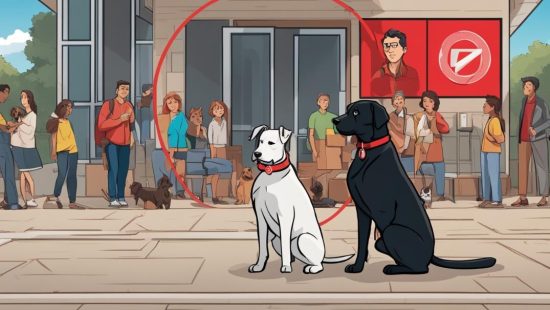
Why Does My Neutered Dog Air Hump?
When it comes to understanding why your neutered dog engages in air humping, there are several specific reasons to consider. By exploring these reasons, you can gain insight into the causes behind this behavior and take appropriate steps to address it.
Attention-Seeking Actions and Owner Responses
One possible reason for your neutered dog’s air humping behavior is the desire for attention. Dogs may resort to attention-seeking actions when they feel ignored or when they want to engage with you. It’s important to be mindful of how you respond to this behavior, as unintentionally reinforcing it can lead to its continuation. Instead of scolding or laughing, try redirecting your dog’s attention to a more appropriate activity or providing them with mental and physical stimulation.
Emotional Release: Stress, Anxiety, and Excitement
Stress, anxiety, and excitement can also trigger air humping in neutered dogs. Similar to humans, dogs may engage in certain behaviors as a way to release pent-up emotions. If your dog exhibits air humping when they are feeling stressed, anxious, or highly excited, it’s important to address the underlying emotions and provide them with appropriate outlets to release their energy. Regular exercise, mental stimulation, and a calm environment can help reduce the likelihood of this behavior occurring.
Compulsive Behaviors and Habit Formation in Canines
In some cases, air humping in neutered dogs may be a result of compulsive behaviors or habit formation. Dogs, like humans, can develop habits that serve as coping mechanisms or provide a sense of comfort. If your dog displays repetitive or ritualistic behaviors, including air humping, it’s crucial to identify and address any underlying issues that may be contributing to these habits. Consulting with a professional canine behaviorist or veterinarian can help develop a comprehensive management plan to break the cycle of compulsive behavior.
Identifying Potential Medical Issues Behind the Behavior
While behavioral factors are often the primary causes of neutered dog air humping, it’s important to consider potential medical issues as well. Certain medical conditions, such as urinary tract infections, skin allergies, or discomfort in the reproductive area, may lead to this behavior. If you notice any other accompanying symptoms or if the air humping behavior becomes persistent or excessive, it’s crucial to have regular veterinary attention to rule out any underlying medical conditions.
| Possible Causes of Neutered Dog Air Humping |
|---|
| Attention-seeking behavior |
| Stress, anxiety, or excitement |
| Compulsive behaviors and habit formation |
| Underlying medical issues |
Behavioral Management: How to Discourage Unwanted Mounting in Dogs
In this section, we will discuss practical strategies for managing and discouraging unwanted mounting behavior in neutered dogs. By implementing these behavioral management techniques, you can effectively address and minimize air humping in your neutered dogs.
When it comes to managing neutered dog air humping, prevention is key. Here are some tips and techniques:
- When you notice your dog exhibiting mounting behavior, gently redirect their attention to a more appropriate activity, such as playing with a toy or engaging in obedience training.
- Establish clear boundaries and rules for your dog, consistently reinforcing them through positive reinforcement and reward-based training. This will help them understand what is acceptable behavior.
- Consider enrolling your dog in obedience training classes or working with a professional dog trainer to address behavioral issues and establish a strong foundation of obedience.
- : Ensure your dog receives enough mental and physical stimulation through regular exercise, interactive toys, and puzzle games. This can help alleviate boredom and reduce the likelihood of them engaging in mounting behavior.
- If your dog’s mounting behavior persists or becomes problematic, it may be beneficial to seek guidance from a veterinarian or qualified behaviorist. They can assess your dog’s overall health and behavior, identifying any underlying medical issues or recommending additional behavior modification techniques.
Remember, managing and preventing unwanted mounting behavior in neutered dogs requires patience, consistency, and understanding. By implementing these strategies and seeking professional advice when necessary, you can help your dog develop more appropriate behaviors and create a harmonious environment for both of you.
| Benefits of Behavioral Management | Techniques for Discouraging Unwanted Mounting |
|---|---|
| Reduces frustration and stress | Redirecting attention |
| Promotes appropriate play and social interactions | Establishing boundaries |
| Enhances obedience and responsiveness | Implementing training methods |
| Improves the overall relationship between you and your dog | Providing mental and physical stimulation |
| Addresses underlying medical issues | Consulting with a professional |
When to Seek Professional Help: Understanding Your Dog’s Health and Well-Being
While it is common for neutered dogs to engage in air humping behavior, there are instances where seeking professional help becomes essential. Understanding your dog’s health and well-being is crucial in ensuring their overall happiness and addressing any potential underlying issues. If your neutered dog’s air humping behavior becomes excessive, compulsive, or causes distress, it is advisable to consult with a veterinarian or a qualified behaviorist.
Professional intervention can help determine if there are any medical conditions contributing to the behavior. Certain health issues, such as urinary tract infections, skin allergies, or neurological disorders, can manifest in the form of air humping. Identifying and treating these conditions promptly is vital for your dog’s comfort and well-being.
Additionally, a professional can assess your dog’s behavior holistically to rule out any behavioral or emotional factors. They can provide guidance on behavior modification techniques, tailored training strategies, and environmental adjustments to help address the underlying causes of your dog’s air humping. By seeking professional help, you can ensure that your dog receives the care and support they need to thrive
FAQs on Why does my neutered dog air hump
What are some misconceptions about air humping in neutered dogs?
It is important to dispel misconceptions that humping is solely a sexual behavior, exclusive to intact dogs, or a sign of behavioral issues. Neutered dogs can also exhibit air humping for other reasons.
What are the specific reasons behind neutered dogs air humping?
Neutered dogs may air hump due to attention-seeking actions and owner responses, emotional release such as stress or excitement, compulsive behaviors, and potential underlying medical issues.
How can I manage and discourage unwanted mounting behavior in my neutered dog?
You can redirect the behavior, set boundaries, and implement training methods to promote more appropriate behavior. Consistency and positive reinforcement are key in effectively managing and minimizing air humping.
When should I seek professional help for my neutered dog’s air humping behavior?
It is important to consult with a veterinarian or a qualified behaviorist if your dog’s air humping behavior is persistent, excessive, or if you suspect any underlying health issues. They can provide guidance and develop a personalized plan for your dog’s well-being.

